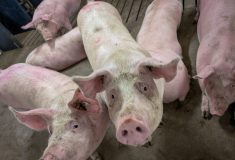A Canadian company that developed a patented process to extract concentrated food-grade protein from canola has been granted creditor protection by an Ontario court.
Toronto-based BioExx and its Saskatoon-based subsidiary BioExx Proteins applied Oct. 1 for creditor protection under the Companies’ Creditors Arrangement Act (CCAA).
The Ontario Superior Court of Justice approved the application earlier this week, granting the companies interim protection from creditors until Oct. 31.
BDO Canada has been appointed as monitor.
“After consideration of the available alternatives, (the company’s) board of directors has determined that it is in the best interest of stakeholders of BioExx and its wholly owned subsidiary, BioExx Proteins of Saskatoon Inc., for the company to commence proceedings under the Companies’ Creditors Arrangement Act,” the company said in an Oct. 1 news release.
Read Also

New Quebec ag minister named in shuffle
Farmers in Quebec get a new representative at the provincial cabinet table as Premier Francois Legault names Donald Martel the new minister of agriculture, replacing Andre Lamontagne.
“Trading of the company’s common stock on the Toronto Stock Exchange has been halted, and the company anticipates that the trading halt will remain in effect pending delisting of the common stock.”
In April, BioExx Proteins of Saskatoon closed the doors to its crushing and extraction plant and initiated a process to sell selected plants assets for $3.5 million.
Proceeds from that sale, which closed in July, were to be used to service debts and supplement working capital.
Also this year, the company announced plans to sell its remaining assets in Saskatoon — including land, buildings and other facilities — and enter an agreement with unidentified European investors to build a crushing plant in Europe with annual capacity of 75,000 tonnes.
The company’s European backers have since backed away from the project, leaving BioExx to explore other alternatives.
“The previously referenced potential strategic partner has decided not to move forward with the company, favouring instead a lower risk and more immediate focus on other vegetable proteins that are already commercially available,” the company announced recently.
In its 2012 fiscal year, BioExx reported losses of $63.27 million, or $0.29 per share.
By June 30, 2013, its current assets, including cash, were valued at $12.5 million. Liabilities totaled $15.5 million.
The company’s stocks last traded Sept. 27 at one cent, down from $2.86 in mid-October 2010.
BioExx said creditor protection was needed to allow for the launch of a sale process under the oversight of its monitor (BDO Canada) and to retain key employees whose expertise can be used to increase the value of the assets to be sold and maximize the recovery of company value for the stakeholders.
BioExx made a splash in 2009 when it landed a $2.95 million repayable loan through the federal government’s Agri-Opportunities program.
The $134 million federal lending program was aimed at promoting the commercialization of innovative products, processes and services.
At the time, BioExx claimed to be processing 60 to 65 tonnes of canola per day in its recently constructed 44,000 sq. ft plant north of Saskatoon.
The $2.95 million repayable loan was intended to help BioExx buy specialized processing equipment, expand its Saskatoon operations and produce the world’s first canola-based human-grade protein isolate for use in body building supplements and other high-protein nutrition products.
One of those products, Isolexx, contained 90 percent protein in a water-soluble form.
Company officials were not available for comment Oct. 2.















